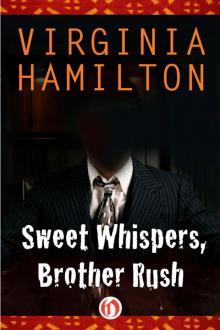- Home
- Virginia Hamilton
Bluish
Bluish Read online
Bluish
Virginia Hamilton
To the wonderful fifth grade, to teacher Judy Davis, and to principal Shelley Harwayne, all at PS 290,
Manhattan New School, New York City.
Thanks for showing me your school, for the rousing discussions of my book project, and for graciously answering my many questions.
You are an inspiration.
Thanks go to Jaime Levi Adoff, founder of Blueish Music.
He generously provided the word and its fine points, which gave me the idea for this book.
Contents
JOURNAL: The First Time I Saw Her
CHAPTER ONE: Dreenie
CHAPTER TWO: Tuli
JOURNAL: Bluish: Time Passes. She Comes And Goes.
CHAPTER THREE: Suppertime
CHAPTER FOUR: The Project
JOURNAL: Bluish: What Bluish Had To Say
CHAPTER FIVE: It’s Going to Get Fun!
CHAPTER SIX: All
JOURNAL: Bluish: Trip Out In The Field, The Vivarium
CHAPTER SEVEN: All Us
JOURNAL: A Record Of Bluish—It’s A New Year
A Biography of Virginia Hamilton
JOURNAL
The First Time I Saw Her
Bluish. In school.
She was there with her puppy. Nobody brings a dog to school! It was right in her arms.
Plus, some kids knew her. I didn’t and Tuli didn’t.
This girl wears a hat, like half a bowl. Sometimes, trying to stand up and walk.
Ms. Baker said, “Natalie, do as much as you feel like. Don’t try to do everything.”
Natalie is this girl’s name. But that’s not what kids call her. Call her Bluish and grin and look at her hard. Bluish fits her. This girl is like moonlight. So pale you see the blue veins all over. You can tell though, once she had some color.
I watch her all the time. She looks real tired. And lets the puppy sit on the floor. It’s all black as night. She said its name. Bucky? I didn’t get it. No! Its name is Lucky.
Never seen anyone like her up close. This girl.
Bluish closes her eyes. Her hands look like moonlight fishes about to dive and flop off the arms of her wheelchair.
Bluish: Another Day
After recess, Bluish sat outside of the classroom. Right in the middle of the hall. So when the buzzer rang we all had to go around her in her chair.
Some boy tried to push her but it was braked I guess. The chair didn’t move.
The pushing all of a sudden made her jump like somebody hit her. Her eyes got real big. I was there.
Started to say: You want me to move you over? But I said: You want me to bring you inside the classroom?
She was looking at me very tough.
“I’m sitting right here until they look at me!” That’s what she said too. Because everybody is pretending not to see her.
She has all these nerves that jiggle her. Her voice is squeaky. Never saw a kid with a teeny mouth like hers. Little line mouth upside-down smile. Makes her look like she’s about to bawl.
Bluish: And Next
Outside. Today I almost fell on the sidewalk. Twice. Black ice. But this is not about me.
She was outside, too. Bluish.
Do I tell Mom about this girl?
She gets on one of the small school buses. I think maybe she comes from across town. She got on the bus with her puppy. A lift rode them up and the driver pulled her chair inside.
I like her hats. Different one today. Blue velvet.
This journal, excuse my mistakes. This is not for school. I’m not looking for a grade. Just all about Bluish.
I love her puppy.
CHAPTER ONE
Dreenie
“WHOOP!” DREENIE YELLED ABOVE the street noise.
She and her little sister were slipping, then sliding, as Dreenie picked their way along the icy sidewalk.
School was out for the day. Bunches of kids, talking loud, were heading over to Broadway.
Bluish.
Like a streak going through Dreenie, reminding her. Pale, glowing, fluttery, was the picture in her mind.
All around, brakes screeched and horns blasted. Cars and taxis slid through the slush.
Bluish.
Dreenie blinked into the hard bits of snow that hit her face. She shouldered her way through throngs of shoppers. Not quite shoving, but pushing through crowds of students and neighborhood folks. Seeing all the holiday decorations up and down Amsterdam Avenue.
Older women of the neighborhood with their shopping carts acted afraid they would be pushed. They went so slow! Dreenie eased around them so her little sister wouldn’t tumble into them.
That had happened before. One woman had looked frightened, even though Dreenie had said she was sorry.
Dreenie was muscled and tall for her age. She often looked angry, even when she was not. She could pretend to be really tough. The woman had clutched her purse. It made Dreenie and her little sister feel bad, that someone would think they’d take what didn’t belong to them. Worst was seeing Willeva’s hurt face.
It was Dreenie’s job to keep everything even. Keep Willeva—everybody called her Willie—in place right next to her.
Good, Dreenie thought. Finished with school for the day. She counted the days until holiday time. Not far off now. A couple of weeks. And she took hold of Willie by her coat sleeve, pulling her along.
“Let go of me, Drain!” Willie hollered, trying to break loose. “Who do you think you are, Drain?”
“Don’t call me that!” Dreenie warned.
“I know who your mama ain’t, Drain,” Willie cried. “Because you sure ain’t one of us Anneva and Gerald Browns! Drain!”
“One more time,” Dreenie warned again. “And stop with the ain’t.” Why is she such a pain?
She and Willie went to the same school and were two grades apart. Lucky to transfer in, a quarter of the way, with school already started. Her dad thought it’d be a better school for them.
Willie was so smart, the teacher let her sit and “observe,” they called it, in the stock market once a week. It was a class full of brainy nerds. Willie was only in third grade, but they even let her pretend she had some stocks of her own in the fifth-grade stock market.
Their school was BCS, Bethune Cookman School, an alternative public school, called a magnet. Kids came to it from all over the city.
Bluish.
Like lightning. Came to Dreenie; and swiftly, Bluish was gone.
Her pal, Tuli, said Bethune was full of arty-darty kids, quick at everything.
Dreenie half admired and was half jealous of them. She would admit that much. There were other, normal kinds of kids. But Tuli tried to be arty-darty, and she tried sometimes to be Spanish, too. She often said funny stuff, like, “Ho-ney, I kid you non.” Dreenie frowned, thinking about it. And, “El Esbanish, y Dominicanish, y Newyo-ricanish are muy cool.”
“Tulifoolie,” Dreenie called her, sometimes. Tuli knew some Spanish words, and probably got a lot of them wrong!
One time when Tuli had been mamboing down the hall between classes singing, “Chica-chica, chica-chica, do the mambo,” and acting older, a girl had said something to her in Spanish.
Tuli had asked, “What?” before she thought to say it in Spanish, “Qué?”
The girl had stared at Tuli. “You give Spanish kids a bad name,” she said in English. Then the girl had walked away. Dreenie had heard her.
Tuli had just stood there, Dreenie remembered. All at once, she’d burst into tears.
Dreenie hadn’t known what to say. Tuli acted like she knew it all, and no one would’ve guessed she’d cry. But she did. Finally, Dreenie led Tuli by the arm into the girls’ restroom.
“I’m nobody!” Tuli had moaned.
And then, roughly, to Dreenie, “Get outta my sight, muchacha!” She was still crying hard.
Dreenie had left her there. She didn’t want to get in trouble, too. “Never be where you’re not supposed to be” was a school rule. But she’d wished Tuli would stop saying the Spanish words. It was dumb-acting, the way Tuli wanted to be something she wasn’t. And Tuli had stayed until somebody had told a teacher she was there. Sitting all sad and alone on the floor of the girls’ restroom. Tulifoolie.
At Bethune, you always got found, Dreenie thought, as prickles of snow hit her in the face. Bethune had special classes for girls who lived in a residence just for them near the school. They were the lost and found, her dad said. Tuli said she was going to live there when she was big. “Ho-ney, better than where I live ahora,” was what she said. Ahora—now—Tuli lived with her granmom Gilla most of the time. With an aunt sometimes.
And no other school had Willie, who was a pest for sure. Probably a genius, too.
Dreenie marched them along the avenue, worrying that she, herself, was a dumbbell. Thinking, Dad says some girls just show smarts quicker than others. Telling me, “You are as good as it gets—even better!” But what if it’s not true? Dreenie thought. What if he’s wrong?
Getting ready to feel—down! All the time having to watch out for Willie, until Mommy gets home. Six-thirty, Dreenie thought. Mommy out in the night. Afraid sometimes something’ll happen to Mommy. This big city!
It was a long time to wait. Dreenie knew that she wouldn’t feel like doing homework. And no TV until the homework was done. She didn’t dare turn it on or Willie would tell. She felt down, like she’d lost her puppy or something. Saw herself hugging a little pooch, and watched it disappear. Only she didn’t own a puppy. She wished she did. She sure wanted one. She thought, If I lost a puppy, it’d feel the way I do now.
Bluish.
All the time in Dreenie’s head. Fit her mood. This girl.
Through all the street noise, worrying about Willie, her shadow.
Bluish.
This girl and her dog, Lucky.
If a girl was blind, she could bring a dog to school. But no one was blind in their school, not even Bluish. This girl’s puppy wasn’t any Seeing Eye dog, either. Might-could be the girl was just spoiled, put-on.
Bluish. Moonlight.
Like, you see moonlight in the city? Yeah, sure. As if! But you can lean out the window and see the moon once in a while. Bluish moon. You see it in movies. Haven’t seen anything quite her shade of pale.
“Ain’t you hungry?” Willie said suddenly, shoving into Dreenie so she would slow down and talk to her. Dreenie knew all her tricks. “Can’t we have some hot chocolate?”
“I’ll make you some when we get home,” Dreenie told her. Their mom didn’t like them fooling around on Amsterdam when school was out.
“I’m not talking about the kind you make. I’m talking about good hot chocolate.”
Dreenie didn’t even give her sister a look. She was watching the avenue. And thinking, Pale moonlight. Scary Bluish.
How many times has this girl been to class since I started at Bethune? I’ve seen her with her puppy a few times. And then without her puppy. I want to hold her puppy! She’d seen Bluish outside after school. The bus with the lift had taken her and the puppy away.
Bitter, damp cold swept over them as Dreenie and Willie rushed along. There were deep, slushy pools at the curbs. They had to be careful, or the cars would spray it up on the sidewalk and all over them. Taking forever to get home!
“Swear to goodness, I wouldn’t drive in this mess if you paid me!” she said to Willie.
“Can’t even drive!” Willie laughed. “Ha-ha, you ain’t even old enough! It ain’t even really snowing yet, though,” Willie added.
“What do you call this mess in my face, then?” Dreenie asked. “And will you quit it with the ain’t stuff? It sounds so dumb.”
“Ain’t is a word, so why not use it?” Willie said, triumphantly.
“It didn’t used to be, until some dumb dictionary put it in it.”
“Zounds, that’s messed up! ‘Dictionary, put it in it.’” Willie snickered. “Dictionaries don’t put words in it. People do.”
“You better shut up, or I’ll hex you!” Dreenie warned.
At once, Willie stopped. Her mouth turned down.
Scaring her little sister. It served her right. Willie’s talking drove her crazy. She had Willie believing she could put a magic spell on her.
“Here’s something you don’t know,” Willie said, getting her courage back. “The word hexagram. It’s a six-sided star the Pennsylvania Dutch painted on their barns. You know why? To ward off bad vibes. But now it’s just decoration. Sometimes called a hex sign.”
“Will you quit?” Dreenie yelled. “I do not care to hear it!”
Willie thought she was so smart. She turned out dictionary stuff without even looking it up. Just from memory.
“I’m going to tell. You’re being mean to me again.” Willie began to whine. “Mommy’ll give you kitchen duty for a week.”
Just once, Willie had gotten the nerve to tell on her. Dreenie did get extra kitchen duty for a week. So then Dreenie had held her breath so long, her eyes bugged out and her face turned purple. Scared Willie half to death. But that was the only time.
There were kids in school who could take a million deep breaths and then fall to the floor. But to do that, you had to have friends there to catch you, ease you down. And Dreenie was still new in school. She didn’t have a lot of friends. Well, maybe she had one. And she knew that any minute her so-called new best friend might catch up with them. Dreenie braced herself.
CHAPTER TWO
Tuli
YOU COULD HEAR TULI coming a block away. Singing. Sounded like, “Chica-chica, chica-chica, boom-may, bahm-ba!” Over and over. Coming at Dreenie’s back.
“Chica-chica-chica!” Screams, and Tuli, Tuli-sound, in the midst of all the street noise, cars, trucks, and horns.” Mira, ho-ney, I eh-saw you looking at you-know-who! You better be-have yourself, or I’ll tell your mah-me!” Herself a holiday decoration, laughing and getting the boys to look at her.
Some kids didn’t like her. They thought she was making fun of the Spanish kids. And Tuli liked to act older, too.
Most of the girls liked her hair—brown with lighter streaks, long over her shoulders and bright in the dull day. Just the springiest curls, and she swung them from side to side as she walked, for all to see. They were like her own private jingle bells.
Tulifoolie. A year and a half older than Dreenie but in the same fifth grade.
Tuli never stopped jumping, shoving, hugging, running, talking. And most of the kids enjoyed her bopping sillies.
“Chica-chica, chica-chica, I see you, Joey! Oh, you got a girlfren’! A little chica-chica-dee tole me. Don’t you lie!”
And Tuli screaming, screaming, chased by Joey as he yelled, “Girl, I’m goin’ get you good!”
“Tuli, you better quit it!” someone’d yelled. Tuli this and Tuli that, up and down the avenue— Dreenie could hear them close behind her now.
“Tuli! Where’d you get the ankle boots, Tuli?”
“Ho-ney, I got frens, I got my ways—y mucho mas, splendido, girlfren’!” Chica-chica-chica. Eleven years old, but acting like a teenager.
Dreenie and Willie were at the intersection. “Watch out, Willie,” Dreenie warned her sister. “There might be ice under the slush.” But Dreenie never got a chance to tell Willie to watch out for Tuli.
“Hooo!” Tuli was there. “I’m right wit you, chiquita, Willie! WILL-EEE!” Tuli slid by them. “HEY … !” She was yelling at the top of her lungs, “HELP, WILL—I AM GO … ING!” And she went sailing off the curb into the crosswalk.
Tuli hit the slush below the curb with both feet. She made a big splash all over Dreenie’s coat. Unable to move, Dreenie stood there, looking down at the mess Tuli had made. She felt the wet slide down her coat and onto her tights.
/>
Seconds later, Tuli slipped, and her feet flew out from under her. “Ahhhh!” she cried out. “Ohhhh, my tailbone!” She lay flat on her back in the middle of the intersection. Her books were still clutched in her arms. A few loose papers sailed through the icy air and settled down on top of her.
“Oh, girl! Tuli!” Dreenie cried. She and Willie ran to her.
Tuli stared up at the bleak, after-school sky. Trying to figure if she should cry or show off, Dreenie thought.
“Get up, girl,” Dreenie said. “Come on, are you hurt? We’ll go to my house.”
Tuli grinned. She loved going to Dreenie’s house. She must not’ve been hurt, Dreenie thought.
“You look very comfortable there, darlin’. You taking a rest?” It was a crossing-guard woman, walking over to them.
Sheepishly, Tuli grinned.
“Come on, Tuli, shoot!” Dreenie said.
“Young lady, the light is going to change any minute. If you’re okay, get up,” the guard told Tuli. She glanced at the light, gave Tuli the once-over.
“I think I’m okay,” Tuli said easily, getting up. And to Dreenie, “I coulda been hurt. You don’t care! I was looking for you guys up ahead, an’en, there you were!” She was steady on her feet now. “I’m all wet,” she said, looking into Dreenie’s eyes.
Now I’ll have to take care of her, too, Dreenie was thinking. “Come on,” she said. “Take your books. I’m not carrying them.”
“Okay,” Tuli said. She looked all disheveled but happy.
“Wow, Tuli, that was a good one!” Willie said.
“Gracias, for inviting me over,” Tuli said shyly, to Willie. “Thanks, Dreenie.”
Not exactly inviting you, Dreenie thought, but she didn’t say it. “Come on,” she told Tuli. “You hold on to Willie for a while.”
“Ain’t nobody needs to hold on to me!” Willie said. But she liked Tuli. Tuli was older and paid attention to her.
“Come on, chiquita, you don’t want to fall like me, eh? Bueno, then. Hold on to my arm, I’ll hold my books.”

 The Planet of Junior Brown
The Planet of Junior Brown Willie Bea and the Time the Martians Landed
Willie Bea and the Time the Martians Landed Zeely
Zeely Bluish
Bluish Mystery of Drear House
Mystery of Drear House M.C. Higgins, the Great
M.C. Higgins, the Great Sweet Whispers, Brother Rush
Sweet Whispers, Brother Rush The House of Dies Drear
The House of Dies Drear Arilla Sun Down
Arilla Sun Down Cousins
Cousins